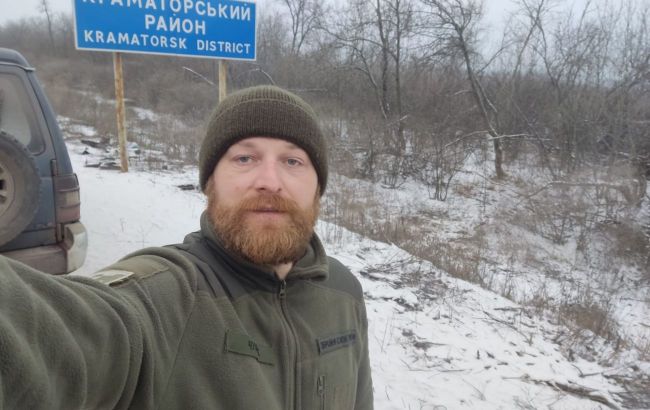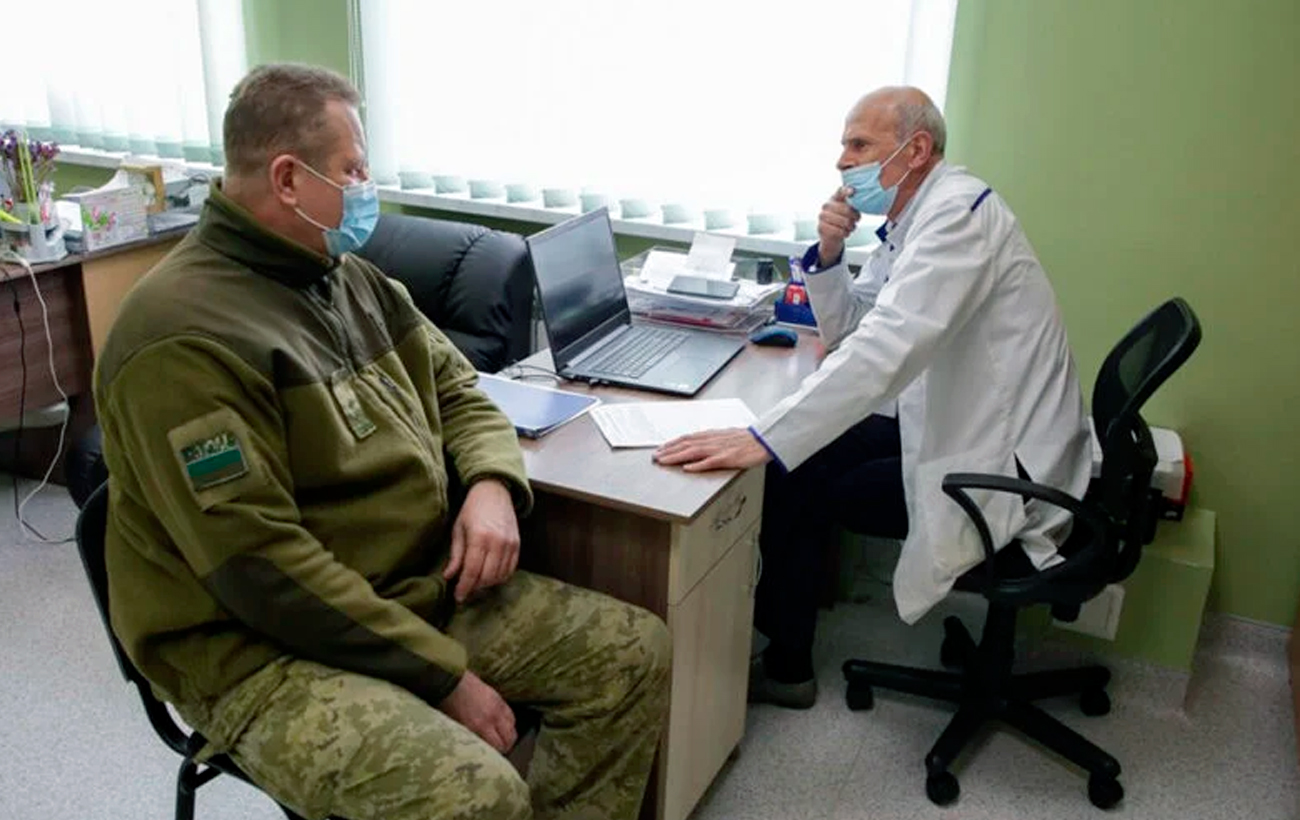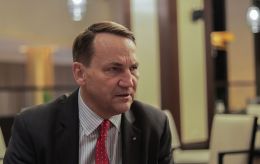Circles of hell from Bakhmut to medical commissions: How a soldier rush around the country for medical papers
 Photo: "Boroda" rushed around the country for a medical certificate (from personal archives)
Photo: "Boroda" rushed around the country for a medical certificate (from personal archives)
Why does the military medical commission system need reform, what humiliations and difficulties do the wounded soldiers have to go through to obtain certificates - read below in the RBC-Ukraine article.
The soldier with the call sign "Boroda" ("Beard") from one of the territorial defense brigades began his military journey on February 26th. His unit was responsible for overseeing the evacuation of the civilian population and protecting the border. And then in mid-March, they were sent to Bakhmut, where a man received an injury that he kept hidden from his loved ones until the end. During his rehabilitation path, he encountered a military medical commission (MMC), long queues, and bureaucracy. He told his story to RBC-Ukraine. Here is his story in his own words.
Battle for Soledar
At the beginning of January 2023, our battalion was urgently returned from a combat rotation to Poltava. And just three days later, on January 13th, we headed east, where they were defending Bakhmut and Soledar. We were assigned to the Soledar area and its surroundings.
On January 16th, I delivered the first group of guys to the place where they switched to an armored vehicle and headed into battle on the outskirts of Soledar. My group of guys engaged in combat on January 18th in the village of Blahodatne near Soledar. We arrived at the location around 5 o'clock in the morning.
Our morning started about an hour and a half later when the first mortar shells started coming in our direction. We faced units of the Wagner PMC. The enemy's artillery, tanks, self-propelled artillery units, and mortars didn't even allow us to raise our heads, but we tried to hold our positions with all our strength and every means available.
A couple of hours after the start of shelling, unfortunately, we had our first casualties. These were shrapnel wounds and concussions from explosions. We had to provide assistance to the guys and transport them to the evacuation point, where they were picked up by an evacuation vehicle. One of our guys had part of his foot torn off during such shelling, and several others received shrapnel wounds of varying severity.
It took me and six other guys four hours to reach the evacuation point. Unfortunately, we had no communication with our unit; we had one or two rations for 40 people, and there was no mobile communication.
Upon arriving at the evacuation point, we learned that our commander had turned part of our guys back halfway and left them at their positions. Closer to the evening, our armored vehicle picked us up, bringing in a new batch of reinforcements. That's how we returned back.
Blahodatne
In Blahodatne we returned in the middle of the night from January 18th to 19th. The commander who met us there instructed us to find shelter and wait till the morning. After that, he said there would be further instructions. We did just that. We even managed to have a small meal of dry ration and warm up with trench candles. Some of the guys even managed to get a few hours of sleep.
The morning started with the command to go out in support of the Kraken unit, which was evacuating the wounded. That's how we returned to the positions we had retreated from the day before.
Four of our men went out to provide support, and later the deputy platoon commander joined them with ammunition. We spent the day in a small forest, without any cover or trenches, just small pits.
Around 14:00, the Russians tracked our positions with a helicopter and started shelling directly at us. During this shelling, our comrade Anatolii Petrenko "Kavzik" was killed. Later, the guys evacuated his body, and we remained to hold the forest in front of a field.
In the evening, a small reinforcement arrived for us, consisting of one person. This guy lost his ammunition while unloading from the armored vehicle, so we went to collect it. Returning to our position, the guys were waiting for us. As we were almost reaching them, we heard the first shot, which hit the area around our legs and pierced my comrade's pocket. The next bullet hit me in the chest. I fell to the ground and told the guys, "I'm 300!" (wounded - Ed.).
My friend Heorhii instantly crawled to me and began firing back. During this time, I was trying to understand where exactly I was wounded. My ribs were hurting badly, probably from the impact of the bullet against the body armor.
My comrade and I managed to remove my body armor and examine the wound. I realized that a pneumothorax was starting. Breathing became difficult. But we managed to stop the bleeding.
We called for a medic, but he said he wouldn't come because there was heavy gunfire in our area. The guys decided that they would carry me out, but there were only three of them, and they were smaller than my 100 kilograms. I decided I would walk myself. The guys helped me get up and supported me.
I had to walk about 200 meters to reach the medic in the dark, through the forest. Midway, two guys from Kraken met me and guided me to a building where the medic was. He examined me and informed me that my chest had been shot through, and I had a pneumothorax, but there was nothing he could do to seal it.
But luckily for me, there was another medic from a different battalion nearby, who had come to reinforce us. This delicate but strong girl named "Pulya" ("Bullet") quickly treated the wound and sealed it with an occlusive dressing. She then helped me stand and accompanied me for evacuation.
Hospital "journey"
So, my medical journey began. Initially, I was transported by an evacuation armored vehicle to a medevac, which directed me to a stabilization center. By the way, I was conscious the entire time, up until the anesthesia, which was about two hours after the moment of injury.
I regained consciousness in the morning. There was a nurse nearby who informed me about my injuries, namely, a gunshot wound to the chest, a concussion, and the rupture of both lungs and diaphragm, as well as fractures of four ribs on the right side and rib fragments that penetrated the liver. And all of this was due to a bullet hitting my chest plate. Then I asked for a phone and called my wife, telling her that everything was fine and I had been stitched up.
From the stabilization center, I was transported to a hospital in Kramatorsk in the morning. From there, after a couple of hours, to Pokrovsk, and from there to a hospital in Dnipro.
In the hospital's admission department, they assigned me the number 9988 and conducted a computer tomography and examination. Afterward, they sent me to the intensive care unit, where I spent three days. Throughout this time, there were nurses and doctors by my side 24/7.
On the fourth day, they transferred me to a hospital ward. My condition was still quite serious. The first time I attempted to get up which took me about 20 minutes. It was very difficult. As soon as they transferred me to the ward, a nurse asked me what I needed in terms of clothing, footwear, and other personal items. Then, a volunteer appeared and inquired about what was necessary.
On the second day of staying in the ward, they informed me that I would be transferred further, to another hospital in Poltava.
In the Dnipro hospital, everything was well-organized in terms of treatment, medication, and food. The only thing was that they were transferring me from there in a very weakened state. I could hardly walk. By the way, they were transferring guys from Dnipro to hospitals all over the country, and unfortunately, in most cases, to cities far away from their families.
They brought me to a hospital in Poltava, where I spent three weeks getting back on my feet. The treatment was provided free of charge. I had fellow patients from other regions next to me, and the hospital provided them with everything they needed. The medicines were all from the government or international aid, but the clothing was a result of the kind-hearted people of Poltava.
After being discharged, by the decision of doctors and the military medical commission (MMC), I was granted a 30-day leave.
Certificate of injury
The first major issue was obtaining a certificate of injury. It is issued by the military unit after an investigation, which no one was in a hurry to conduct. Without this certificate, it was impossible to prove at the MMC that the injury was sustained during combat operations.
To obtain leave, in addition to the decision of the MMC, I had to write a report in my unit. Then they create an order, under which you are sent on leave. And here's the difficulty: I was in Poltava, and my unit was in the Donetsk region. That's 500 km away. There were many wounded soldiers in Poltava. We had to travel about 1000 km to write a piece of paper that could be sent by courier or by soldiers who commuted at least once a week from the Donetsk region to Poltava. But you had to do it yourself.
After receiving leave, you need to register with the military enlistment center or MLE (military law enforcement). Only after this, you are officially on leave. All of this took 3-4 days for a person with their own transportation and relatively normal health. But what about someone who is receiving treatment in Lutsk while their unit is in the Donetsk region?
After the leave, I still didn't feel well, so I had to continue my treatment. To do this, I had to contact the medical personnel of my unit, who were in the Donetsk region while I was in Poltava. Then we go there and get a referral to see a doctor and return to Poltava to the hospital.
At the doctor's, we get a referral to treatment in the hospital and go back to the Donetsk region, to the military personnel who issue an order for treatment. Then we look for the head of the food department and give them the extract from the order, which proves that you are removed from the unit's provision. This took about two days. Then we return to Poltava for treatment.
After treatment and discharge, you can be granted leave again, but not more than a total of 150 days. After treatment, you may also be sent for an MMC examination, either voluntarily or at the doctor's decision. They give you a referral, with which you go to the unit, where you need to get a referral.
There is an option that you may be hospitalized for the MMC examination. Then you need to get certificates and return to the hospital for the examination. To undergo the MMC examination in the unit, they create an order, send it to the sanitary unit, which creates an order and returns it for the management's signature. Then you go for the MMC examination.
Military Medical Commissions
Usually, the MMC examination is conducted in hospitals located in the regions where the military unit is stationed. There's also an option to undergo the examination at your place of residence, but this is generally not allowed for military personnel. The MMC procedure itself is quite lengthy. It begins with registration at the hospital and obtaining a referral to the MMC examination.
Then, you need to see various doctors: a therapist, surgeon, dermatovenereologist, ENT specialist, ophthalmologist, dentist, psychiatrist, and neurologist. After that, your documents are submitted for review by the MMC.

Photo: A military personnel undergoing examination (ArmyInform)
You also need to provide test results, and if necessary, undergo X-rays, CT scans, MRI scans, or an electrocardiogram, depending on your medical condition or complaints.
To see doctors at the Poltava Hospital, you need to stand in a live queue from half an hour (dentist, ENT specialist, dermatologist) to a couple of days (neurologist, surgeon, psychiatrist). This is due to the high number of injured and concussed soldiers.
However, there's an option to join an electronic queue for medical consultations, but this can take up to a month because of the high number of requests, and electronic queues are not always considered. During the MMC examination, you may be referred for treatment, and for this, all the necessary documents for hospitalization need to be prepared again.
The MMC examination result can be: fit for service, fit for service with limitations, temporarily unfit for service for up to six months, or permanently unfit for service. Decisions can be appealed through the authorities in Kyiv, but the examinations can only be conducted in authorized hospitals.
The main problem in this process is getting referrals for referrals. There has never been a queue with fewer than 20 people. And this takes 2-3 hours.
There was no anger during the waiting. More likely, there was a feeling of indignation that people with broken or missing limbs, who had suffered concussions, had to stand in line and wait for something.
 Photo: A military person on crutches (GettyImages)
Photo: A military person on crutches (GettyImages)
Additionally, it was possible to at least visit the ward of an injured soldier and inform them of the MMC examination result. Especially since there is a daily inspection of the wards, and they communicate with each injured soldier.
Personally, my MMC story ended with a decision: fit for service with limitations. This means I can no longer serve in airborne assault brigades or marine infantry; now, my tasks are limited to logistics units or military enlistment offices. I believe someone has to do this work, even though I'd rather be with my comrades.



